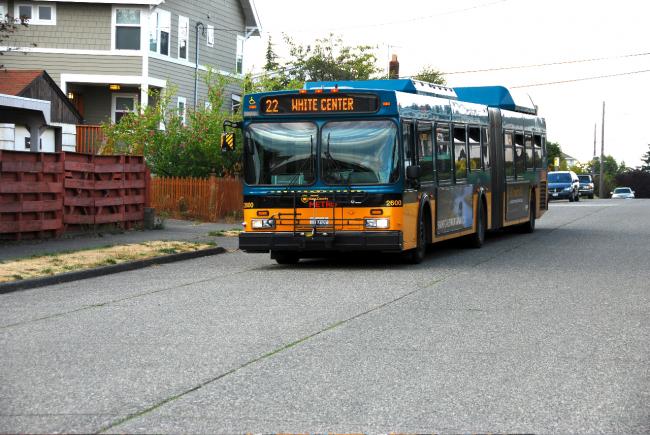Auditors release efficiency findings for Metro
An audit of Metro Transit presented Sept. 1 said the county could save money by replacing electric trolley buses with electric/diesel hybrids.
Tue, 09/01/2009
The King County Auditor's Office has identified up to $31.7 million in annual savings, $51 million in increased revenue and $105 million in one-time savings within Metro Transit operations.
Auditors presented the first half of the Transit Performance Audit to the King County Council's Government Accountability and Oversight Committee Sept. 1.
Metro is facing a projected $213 million deficit. The release of the partial Transit Performance Audit came three weeks after Metro Director of Operations Kevin Desmond spoke to the Seattle City Council about Metro's budget crisis and King County Executive Kurt Triplett's plan to deal with it.
"Metro is one of the best run agencies in the county," King County Council member Reagan Dunn said. "But, there is room for efficiencies in every agency."
Auditors found that Metro has focused more on service quality than cost efficiency in the past, and many opportunities exist within the department to increase efficiency and generate revenue.
Metro could save up to $19 million per year by cutting the amount of time bus drivers spend on break in between trips, according to auditors.
Metro drivers currently spend 29 percent of their transit cycle on recovery time between trips, according to the Transit Performance Audit. Other transit agencies around the nation average 21 percent.
In response from concerns voiced by council members Dunn and Larry Phillips, a representative for the auditors said a reduction in break time could be made without violating the county's labor agreement with drivers.
By cutting recovery times, it could reduce the number of buses needed for peak-hour service and reduce the size of Metro's fleet, according to the audit.
The audit stated that keeping buses full on all trips to Metro bases, as opposed to having empty buses returning to bases, would save up to $3.7 million per year.
The same amount could be saved by using new scheduling software to create the most efficient bus schedules possible, according to the audit.
What to do with Metro's aging trolley fleet will pose problems for the county in coming years. Trolleys are the electric buses that run on overhead wires in come areas of the city.
Desmond said the trolleys will need to be replaced by 2014. According to the audit, it would save Metro $8 million per year to replace the trolleys with electric/diesel hybrid buses.
However, auditors recognized that there are other factors that way on the decision, such as noise and pollution.
Phillips said noise will be a growing concern for densifying neighborhoods, and trolleys would help to ease that.
The audit determined that there are inefficiencies in terms of fare goals and implementation, including overly generous discounts for seniors and youth.
For example, a representative for the audit there is no requirement for a youth fare reduction, but Metro is giving one of more than 60 percent.
Auditors also recommended that Metro, which spends $96 million per year on new buses and $94 million per year on repairs and maintenance, replace old buses based on when it would be most cost effective, not when the bus has reached its expiration date.
The second half of the Transit Performance Audit, including findings in staffing and vehicle maintenance, will be presented to the King County Council, along with responses from the King County Executive, on Sept. 15.


